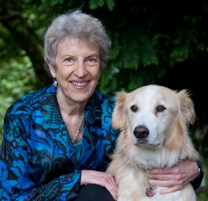by Alice Hardesty
This is really more my husband’s story than mine, but it seems to me that the hardships of the spouse or care-giving family members are often neglected. The feelings that arise in the cancer spouse/partner can be troublesome because they can be very negative, while the cultural expectation is that the caregiver is tireless, patient, and loving. What if you just came right out and said, “I’m completely stressed out from worry and hard work. And I’m tired of my husband/wife getting all the attention. Nobody ever listens to me!” Well, I actually said those kinds of words. Yet I wasn’t struck by lightening, our marriage not only survived but thrived, and my husband got well.
The early years of my marriage to Jack were not happy ones — it seemed that neither of us knew quite what we were getting into. After being married only two years, he was diagnosed with esophageal cancer, a particularly deadly disease. Despite two separate rounds of conventional medicine, involving chemotherapy, surgery, and radiation, all the doctors seemed to give up on him.
However, Jack was not about to give up. Nor was I. So he decided to try every alternative form of healing we could think of, including vitamins and enzymes, Reiki, massage, spiritual healing, meditation and visualizations, and intensive psychotherapy. I had learned acupressure and foot reflexology, which I gave him every day for more than a year, and which turned out to be relaxing and healing for me as well as for him. Within slightly more than a year he was cancer free. Jack lived for 24 years after the initial diagnosis, most of which were healthy and happy, and he did not die of cancer.
We both agreed that a critical ingredient in Jack’s healing was psychotherapy. Our therapist, Barbara, was a no-nonsense counselor who was very directive with us. She knew the seriousness of Jack’s condition and was not about to let us waste any time. Barbara pulled out our darkest secrets and made us communicate from and with the heart. She encouraged us to release repressed emotions, sometimes even by beating on pillows and crying. But she always brought us to a place of reconciliation by the end of each session. With Barbara, I could finally express the “socially incorrect” feelings of anger, resentment, and fear that Jack’s cancer had provoked. I was angry that he was threatening to check out on me, resentful that the treatments used up so much of our shrinking income while he was still paying alimony to his former wife, and fearful of the very real possibility of losing him, of widowhood. Barbara understood my level of stress and she understood the importance of healing our marriage as well as the physical healing.
I believe that the treatment of cancer patients is most likely to succeed when the spouse, partner, or main caregiver is fully respected and attended to, even when she or he needs to express those “socially unacceptable” emotions. This is best accomplished in the therapeutic setting.
Every case is different, as is every human soul. Some cancer patients will need relatively little care from their families, and others will need a great deal. Some caregivers will respond with confidence and equanimity, while others (like me) will need reassurance and important insights. I am not suggesting that couples always travel the psychotherapeutic road together, although it was certainly useful in our case. But the caregiver should always have at least the opportunity for individual counseling. Everyone would benefit.
Bio: Alice Hardesty is a poet and writer living in Portland, Oregon. Her memoir, A Cancer Journey: The Cosmic Kick That Healed our Lives, is the story of her husband’s extraordinary healing from esophageal cancer, despite two “terminal” diagnoses.
The book comes highly praised by Jan Adrian, Jean Shinoda Bolen, and Ruth Bolletino. You can order it from Alice’s website, http://bachopress.com, where you can learn more about Alice, subscribe to her newsletter, and follow her blog. The book is also available on Amazon.






